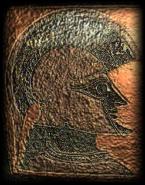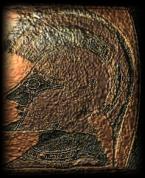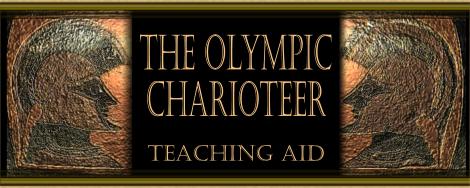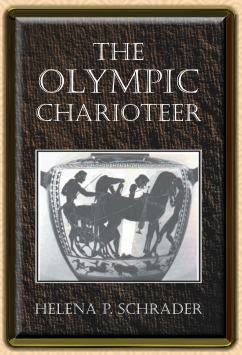
HOME
CONSTITUTION
ECONOMY
EDUCATION
ETHOS
FOREIGN POLICY
WOMEN
MARRIAGE
SEXUALITY
ART
LEONIDAS
ESSAYS
NOVELS
SOURCES
SCREEN SAVER
GUEST BOOK
AUTHOR BIO
SPARTA BLOG
AUTHOR WEBSITE
SPARTAN THEMED
T-SHIRTS, TOTES
& MORE
CONSTITUTION
ECONOMY
EDUCATION
ETHOS
FOREIGN POLICY
WOMEN
MARRIAGE
SEXUALITY
ART
LEONIDAS
ESSAYS
NOVELS
SOURCES
SCREEN SAVER
GUEST BOOK
AUTHOR BIO
SPARTA BLOG
AUTHOR WEBSITE
SPARTAN THEMED
T-SHIRTS, TOTES
& MORE


 FREE
TEACHING AID
FREE
TEACHING AID 
This free teaching supplement is designed to aid teachers as they lead students through Helena Schrader's, Olympic Charioteer.
Teachers will find questions to get students actively thinking and talking about the issues covered in the novel. Questions help students retain knowledge from each chapter and allow teachers to follow students' reading progress.
Olympic Charioteer is a recommended and accurate historical novel for any course that involves the Olympics, Ancient Greece, Sparta, History, English Literature or Women's Studies. Google Book Search offers an extensive preview of Olympic Charioteer.
Questions Regarding the Novel
1. How did Lysandridas regain the respect of his countrymen?
2. In the second half of the book, Lysandridas is a man with divided loyalties. What aspects of each city-state claimed is allegiance? What alienated him in both cities? Do you think he made the right decision?
3. Could Lysandridas have been happy if he'd stayed in Tegea, never returning with Teleklos?
4. Could Leonis have been happy in Tegea?
5. What factor was most decisive in Lysandridas' second Olympic victory? Threats/motivation? Luck/the mistakes of others? Experience?
6. Chilon the Wise is one of the "Wise Men" Ancient Greece and at least three of his sayings were carved in stone at Delphi. How does Chilon's analysis of Sparta in this book correspond to what you have read elsewhere? What have you learned about Sparta from this book?
7. Tegea was the first city-state in Greece to sign a non-aggression pact with Sparta. Over the next 100 years, Sparta signed a series of similar treaties creating a network of alliances which were known collectively as the Peloponnesian League. What does this (and the description of events portrayed in the novel) tell us about Sparta that differs from the simplistic view of Sparta conveyed by films like "300" or even Steven Pressfield's "Gates of Fire"?
8. What "crime" did Lysandridas commit in the eyes of his countrymen? How does he regain their respect? How do others help?
9. Would Teleklos have been happier, if he had accepted his son's death?
10. At several points in the novel, Philip/ Lysandridas is tempted by - or even determined to - commit suicide. Do you think you would have reacted in the same way? What are the arguments for and against suicide in a pre-Christian world?
11. What does this book reveal about the relative position of women in Sparta and other Greek cities?
12. Before Antyllus realizes where Philip really came from, what are the clues as to his origin? (Cite as many as you can.) Why do you think it takes Antyllus so long to arrive at the truth? In what way is Philip's situation unusual?
13. Describe how, in this story, misunderstanding of another's culture causes problems.
14. Compare and contrast the following aspects of life in the two city-states in which this novel is set:
15. What would you like most about living in each of the two city-states at that time? What would you find most difficult?
- Values: What was considered important in each society?
- Societal class structure: Distribution of wealth, how people earn a living, and how they spend their money
- The roles of men and women and how they relate to each other: How children are brought up and how young people are educated
- Human rights: What did each society consider human rights to be?
- Now compare and contrast these aspects of life in each city-state to life in your own culture today.
16. Discuss the use of war as a political tool, as reflected in this novel. How does war affect population in the two city-states?
17. What part do religion and the Gods play in the lives of the people in this story? How do some people in the story use religious beliefs for power over others?
18. In what ways are the Olympic Games described in this story like the Olympics of today? In what ways are they different?
Topics for further Research/Assignments
1. Research the Ancient Olympic Games: the origins, events, ceremonies, participants, etc.
2. Who was Chilon? What do we know about him? Which of his sayings were carved in stone at Delphi? Who were the other "wise men" of Ancient Greece?
3. Were women participants at the Ancient Olympics? Who was the first woman to win an Olympic victory? In what event and when?
4. What is the myth of Orestes? Why was possession of his bones so important to both Sparta and Tegea?
5. Tegean was the first city-state in Greece to enter a non-aggression pact with Sparta. Over the next century, Sparta concluded a series of such pacts creating a network of alliances that became known collectively as the Peloponnesian League. Find out more about this League: the membership, its role in history, etc.

Reader View Review
your copy today!
Under "SOURCES" you will find the research materials I used in this supplement, book and website. These materials are also additional recommendations of both fiction and non-fiction books, including selected ancient and modern sources for your own research and/or reading pleasure.
ONLINE TRANSLATOR AND DICTIONARY
This site is best viewed with IE6 (or higher), a browser window sized at 1024 pixels wide or wider, and with a monitor display resolution set at 1280x1024.
PRIVACY I COPYRIGHT I CITING I SITE MAP
Text varies on this site between British and American English spelling. Most research was done in Europe and compiled for British English publications. Interviews and reviews reflect both American and British English, as Helena Schrader is a leading authority on this subject in the US and Europe.
Contents of this website are copyrighted. ©1993-2012 Helena P. Schrader unless otherwise noted. If you would like to use the material of this site, please contact Helena Schrader. If you experience any problems with this site, please contact the web mistress.
Last updated September, 2012
Site design and maintenance Crystal Cloud Graphics
Web Hosting Elysium Gates.com
Site design and maintenance Crystal Cloud Graphics
Web Hosting Elysium Gates.com



